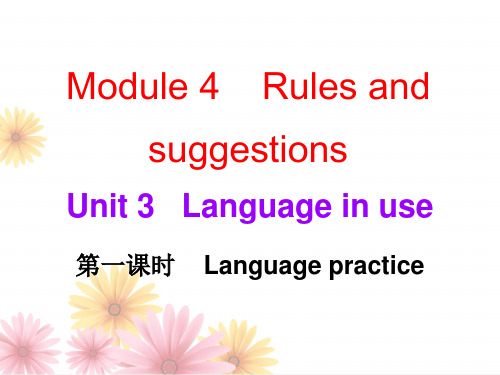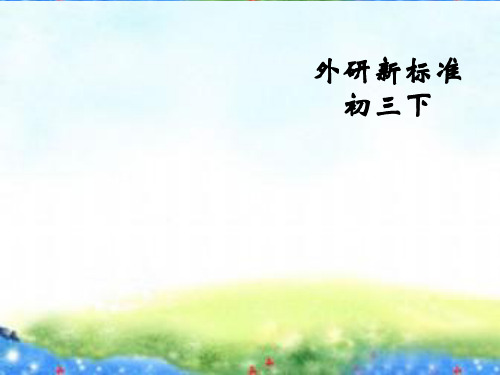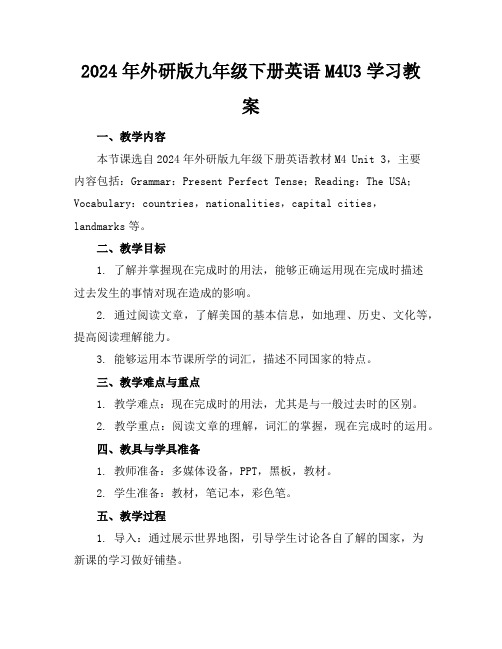外研版九年级下册英语M4U3
外研版九年级英语下册内文课件:Module4Unit3(共16张PPT)

二、单项填空
( C )1. —Must I finish the work tonight? —No, you _____. But you _____ finish it tomorrow.
A. can’t; need
B. mustn’t; may
C. needn’t; must
D. mustn’t; can
A. need
B. needn’t
C. must
D. mustn’t
( A )5. I _____ follow you. Would you please repeat it?
A. can’t
B. mustn’t
C. needn’t
D. shouldn’t
第二课时 Writing
美文鉴赏
功能话题 日常活动 (中考考纲话题项目表第4条) 一、学会写关于规则与建议的相关文章 Good afternoon, everyone! We are studying in this school. It’s our duty to keep it clean and tidy. It’s not good to spit in public places, such as in the library and in the classroom. We should neither draw pictures on the walls nor throw any litter onto the ground. I think we must make it a rule to do some cleaning every day. If everyone tries his best to do something useful for our school, I’m sure our school will be more beautiful. Thank you!
外研版初中英语九年级下册Module 4 Unit 3 Language in use-课件

11. I’m really looking forward to the Shakespeare play. 12. It’s on the right. 13. I’ll meet you in front of school at two o’clock this afternoon. 14. Everyone spends money on clothes. 15. Most people dress in a way that shows off their personality. 16. What’s the logo on your trainers?
6. It’s that girl with long hair, over there. 7. Oh, take a look at that amazing skirt! 8. I think we’re going to be here for some time. 9. Many young people today care about the way they look. 10. What’s the logo on your trainers?
1. It’s cold _in_ May. 2. Turn left and go _a_lo_n_g_ Wangfujing, and it’s o_n_ the right. 3. We’ll go _b_y bus. 4. I’ll meet you _in_ f_r_o_n_t _o_f school _a_t two o’clock this afternoon.
语法讲解建议采用归纳法,如尽 可能多的呈现一些相关例句,或 可让学生从已学课文中找相应例 句,引导学生试着从所观察到的 语言现象中总结出语法规律。
初中英语外研版九年级下册《Module 4 Unit 3 Language in use. Per

1. No parking.
1
2. Don’t play football.
3. You mustn’t stop here.
2
3
×
Grammar revision.
Match the signs with the rules.
• Be careful of children crossing the road.
7. Birds use small __s_ti_c_k_s and leaves to make a home.
Listening task1 Listen and answer.
1. Is Zhang Wen’s school a green one? Yes, it is.
2. What should we do when we leave a room? We should turn off the light.
e.g.Everyone should play a role/part in protecting the earth. 每个人都应当在保护地球中发挥重要作用。
1 You should _t_h_r_o_w__li_tt_e_r_s_in_t_o__th_e__li_t_te_r_b_i_n_s_
Module 4 Rules and suggestions Unit3 :Language in use.
外研版九年级下
1
Warming-up
What do you think of your school life? What do you like best about school?
grades, subjects, lessons, classmates, teachers clubs, homework, favourites …
外研版九年级英语下册课件 Module4 Unit3

A. close
B. not to close
C. don’t close D. not close
6. — Where’s Tim?
— I’m not sure. He _____ in the school library.
A. maybe
B. must be
C. may be D. will be
2. What does Zhou Zhiyun try to say with his painting?
People must not waste electricity.
3. What does the school suggest the students should do?
Students should pass on what they have learnt at school to their parents and neighbours. 4. How can a school become a “green school”?
needn’t/ don’t have to
单项选择。
1. Students in our school _______ know
shouting is not allowed in the library.
A. can
B. may
C. must
D. need
2. You ______ drive your car so fast. It’s very dangerous.
— We _______ go to Xiamen, but we’re
not sure.
A. needn’t B. must C. might D. mustn’t
2024年外研版九年级下册英语M4U3学习教案

2024年外研版九年级下册英语M4U3学习教案一、教学内容本节课选自2024年外研版九年级下册英语教材M4 Unit 3,主要内容包括:Grammar:Present Perfect Tense;Reading:The USA;Vocabulary:countries,nationalities,capital cities,landmarks等。
二、教学目标1. 了解并掌握现在完成时的用法,能够正确运用现在完成时描述过去发生的事情对现在造成的影响。
2. 通过阅读文章,了解美国的基本信息,如地理、历史、文化等,提高阅读理解能力。
3. 能够运用本节课所学的词汇,描述不同国家的特点。
三、教学难点与重点1. 教学难点:现在完成时的用法,尤其是与一般过去时的区别。
2. 教学重点:阅读文章的理解,词汇的掌握,现在完成时的运用。
四、教具与学具准备1. 教师准备:多媒体设备,PPT,黑板,教材。
2. 学生准备:教材,笔记本,彩色笔。
五、教学过程1. 导入:通过展示世界地图,引导学生讨论各自了解的国家,为新课的学习做好铺垫。
2. 新课展示:呈现PPT,介绍现在完成时的用法,结合实例进行讲解。
3. 阅读文章:引导学生阅读文章,了解美国的基本信息,同时学习新词汇。
4. 例题讲解:结合教材,讲解现在完成时的练习题,帮助学生巩固所学知识。
5. 随堂练习:让学生运用现在完成时,描述过去发生的事情对现在的影响。
6. 小组活动:分组讨论,用所学词汇描述不同国家的特点,并进行汇报。
六、板书设计1. M4 Unit 3 The USA2. 内容:Grammar:Present Perfect TenseVocabulary:countries,nationalities,capital cities,landmarksReading:The USA七、作业设计1. 作业题目:a. 根据所给句子,用现在完成时改写。
b. 阅读短文,回答问题。
九年级英语下册 Module 4 Unit 3课件(新版)外研版

are __c_l_e_a_rl_y_m__a_r_k_e_d_p_a_t_h_s__. 3. You should only take marked ____p_a_th_s____. 4. Make sure you know where ___y_o_u__c_a_n_s_t_o_p____ for lunch. 5. Don't forget to tell people to ____b_r_i_n_g_f_o_o_d_____ for the picnic. 6. Don't walk when it is _t_o_o_h__o_t_ or in _v_e_r_y_b_a_d__w_e_a_t_h_e_r__. 7. You must not try out a __n__e_w__w_a_lk___with a group.
He tries to say that people mustn't waste electricity.
【外研版教材适用】初三九年级英语下册《Module 4 Unit 3》课件
Presentation
2) should (ought to)表示推测时,是指有
一定根据的推测,意为“可能、该”。
—When can I come for the photos? I need them tomorrow. —They should be ready by 12:00.
It’s nearly seven o’clock. Jack should be here at any moment.
Presentation
Practice ( B )1. —Must I stay at home and take care of her? —No, you ______. A. mustn’t B. needn’t C. can’t ( B )2. Please don’t throw paper about. We _______ keep our environment clean. A. can B. must C. may
1. No parking. 2. Don’t play football. 1
3. You mustn’t stop here.
2
×
3
Presentation
Match the signs with the rules.
• Be careful of children crossing the road. • It’s dangerous to stay out in the sunshine too long without a hat. • Smoking is not allowed inside the building. • Never go mountain climbing in bad weather.
外研版九年级下册英语课件Module4Unit3Languageinuse
D. Safety and Accidents
【点拨】标题归纳题。全文都 是围绕交通安全讲座叙述的。
课文精华
从方框中选择恰当的单词并用其适当形式填空,完
成短文
friend, still, sudden, rule, hang, care, close, wear, together, thirsty
学必有法
三、素材积累 (一)描述建议和规则类话题的常用词汇 rule, obey, allow, must, mustn't, should, remember, instead of, make sure, protect oneself, be good for, duty
学必有法
(二)描述建议和规则类话题作文的常用句型 1. As middle school students, it's our duty to. . . 2. Here are some rules we must obey. 3. It is important for us to keep safe at school and. . . 4. Rules play an important part in. . . 5. First, . . . Second, . . . Third, . . .
学必有法
一、话题分析 本单元的话题是“规则和建议”,生活中有很
多的规则需要遵守,尤其是在旅途中,更需要注意 这些规则和良好的建议,确保安全。
学必有法
二、写作方法 “三步法”写规则类作文 1. 提出主题。开门见山提出建议和规则。 2. 规则描述。对建议和规则进行详细描述。 3. 表达观点。针对建议和规则表达自己的观点。
forced herself to get up early this morning.
外研版英语九下M4-U3
表示义务、命令或必要 意为“必须、应当”。
➢You must be careful of falling stones. ➢You mustn’t walk too close to the edge of the hill path because you might fall and hurt yourselves.
Possible answers: ① You must check in at the main gate when
you come to the centre. ② You should climb with someone. ③ You must wear a hard hat at all times. ④ You must wear the proper climbing shoes. ⑤ You must wear comfortable clothes. ⑥ You mustn’t climb without a rope. ⑦ You mustn’t eat or drink anywhere except in
1. You __m__u_s_t __ be careful of falling stones. 2. You _m__u_s_t_n_’t_ (not) walk too close to the
edge of the hill path because you _m_i_g_h_t__
fall and hurt yourselves.
1)简可能在家。 Jane might be at home.
2)我可能会跟他说说。 I might talk to him.
表示许可或请求做某事, 意为“可以”。
— Can we go rock climbing? — No, you can’t.
最新外研版英语九年级下册Module4 Unit 3
Read and pay attention to the colored words.
You must be careful of falling stones. You mustn’t walk too close to the edge of the hill path because you might fall and hurt yourselves. You should always wear proper clothes. Bears might think our rubbish is food. --- Can we go rock climbing? --- No, you can’t.
Complete the rules.
Don’t drink the water.
No swimming.
Don’t climb the ladder. You mustn’t turn left.
Match the pictures and the rules.
1. No parking. 2. Don’t play football. 3. You mustn’t stop here.
4. should 表示“应该”,常用来表示劝告、建议, 认 为“某人应该做某事”或“有义务责任做 某事”。 We should obey traffic laws. You shouldn’t have made this kind of silly mistakes. 这时它可以和 ought to, be supposed to 互 换使用 。
( A )26.— _______ we clean the classroom at once? — No, you _______. You _______ clean it after school. (2011•铜仁) A. Must; needn’t; may B. Must; mustn’t; can C. Shall; can’t; must D. Need; mustn’t; may 【解析】情态动词的用法。根据前后句意可推 断对方在询问“我必须马上打扫教室吗?”。 而must引导的一般疑问句否定回答用needn’t。 故选A。
- 1、下载文档前请自行甄别文档内容的完整性,平台不提供额外的编辑、内容补充、找答案等附加服务。
- 2、"仅部分预览"的文档,不可在线预览部分如存在完整性等问题,可反馈申请退款(可完整预览的文档不适用该条件!)。
- 3、如文档侵犯您的权益,请联系客服反馈,我们会尽快为您处理(人工客服工作时间:9:00-18:30)。
精选课件
11
2. 表示可能性 如果要表达“可能,可能性”,可以用 may/ might或 can/ could. e.g. Jane may be at home. 简可能在家。
Would you mind …?
e.g. Would you please help me with this
suitcase? 你可以帮我拿这个手提箱吗?
Would you mind turning down the
music?
你能把声音关小精选点课件儿声吗?
14
5. 表示建议和邀请 表建议和邀请可用下列表达方式:
精选课件
1
精选课件
2
Must we obey the traffic rules?
精选课件
3
Must we obey the school rules?
精选课件
4
What do you think of their behaviors?
精选课件
5
What do you think of his behavior?
I might talk to him. 我可能会跟他说说
You can go to Beijing by train. 你可以坐火车去北京。
精选课件
12
3. 表示许可或征求对方许可 如果表达允许某人做某事,或征求对方的 许可,可以用can/could/may/might。 e.g. You can / may start your work now. 你现在可以开始工作了。
time of need. 你不用担心钱,你需要的时候我
可以借给你。
精选课件
18
London Indoor Climbing Centre Visitors please note: Dos • Check in at the main gate when you come to
6. Do not drink and drive.
精选课件
10
情态动词
1. 表示能力 表示一个人能做某事时,常用can或could表达。 e.g. As soon as Mike could read, he read books about robots. 迈克刚能看懂书,就看关于机器人的书。
—No, you can’t. 精选课件
8
a
b
c
1. No smoking. c
2. No eating or drinking. b
3. Children crossing.
4. Danger! Be careful of falling rocs.
5. Children should be taken care of by parents.
8. 表示命令、禁止、不得不 表示这类含义时,一般用must, mustn’t, have to等。
e.g. You must study maths to be an
engineer. 要当工程师,你必须学数学。
You mustn’t tell it to anyone. 你不许把这件事告诉任何人。
You have to come early tomorrow.
你明天得早到。
精选课件
17
9. 表示没必要做某事 表示没必要做某事时,常用needn’t, don’t have to等。
ห้องสมุดไป่ตู้
e.g. You don’t have to worry about
money. I can lend you some in
Could / May I come a little later tomorrow? I don’t feel myself. 我明天可以晚到一会吗? 我觉得不太舒 服。
精选课件
13
4. 表示请求对方做某事 如果要请求对方做某事,可以用下列表达
方式:
Will / Would / Could you (please) …?
7. 表示应该、义务 表示应该、义务等时常用should, ought to,
must.
e.g. You should talk to your parents. 你应该跟你父母谈谈。
I ought to train more to improve my skill. 我应该多精训选课练件 来提高技巧。 16
Would you like (to) …? Shall we …? e.g. Would you like to play basketball?
你想打篮球吗? Shall we go? 我们走吧?
精选课件
15
6. 表示意愿 表示想做某事可以用would like/ love to …
e.g. I’d like to be a scientist. 我想成为科学家。
the hill path because you might fall and
hurt yourselves.
3. You should always wear proper clothes.
4. Bears might think our rubbish is food.
5. —Can we go rock climbing?
精选课件
6
Have you ever made such kind of paper by hand?
精选课件
7
Pay attention to the following sentences.
1. You must be careful of falling stones.
2. You mustn’t walk too close to the edge of
6. Do not drink and d精r选iv课件e. a
9
d
e
f
1. No smoking.
2. No eating or drinking.
3. Children crossing.
d
4. Danger! Be careful of falling rocks. e
5. Children should be taken care of by parents. f
